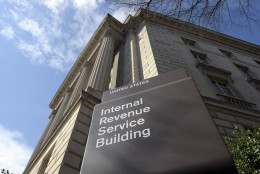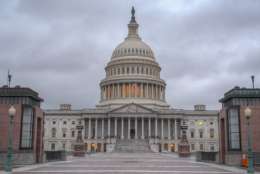Tony Reardon
-
President Donald Trump has officially announced his intention to Congress to give civilian employees a 1% federal pay raise in 2021. His submission of an "alternative pay plan" comes months before the typical August deadline.
February 10, 2020 -
President Donald Trump's proposed 1% across-the-board federal pay raise is an attempt to meet Congress "halfway" on the topic, as the administration also recommended more agency funding on employee performance rewards and bonuses.
February 10, 2020 -
A bicameral pair of lawmakers have reintroduced legislation for the sixth consecutive year now, which would ensure employees get a federal pay raise in 2021.
January 28, 2020 -
Social Security Administration leadership met with employees Monday to announce a series of changes to existing telework policies, but the new arrangements vary widely across the agency and depend on an employee's component -- and whether or not an employee is part of a specific bargaining unit.
January 27, 2020 -
With this year’s tax season set to start Monday, NTEU has renewed concerns that the IRS, after a decade of budget cuts, has fewer resources to tackle a growing workload.
January 24, 2020 -
With the nominees to restore a quorum at the Merit Systems Protection Board still sitting quietly in the Senate, disagreement has begun over who's to blame for the historic absences at the board. In an exclusive report, Federal News Network explored different sides of the debate.
January 24, 2020 -
The Office of Personnel Management is currently drafting regulations needed to implement the Federal Employee Paid Leave Act. Members of the public will have a chance to comment on those regulations, due sometime in late spring.
January 10, 2020 -
HHS committed a “clear and patent violation” of its 2010 collective bargaining agreement with NTEU, according to an independent arbitrator.
January 02, 2020 -
The Congressional Budget Office's price tag on paid parental leave does not take into account employee turnover.
December 16, 2019 -
A 3.1% federal pay raise is a key feature of one of two "minibus" spending bills, which congressional appropriators unveiled Monday evening. Both the House and Senate are expected to quickly vote on both this week before Friday's funding deadline.
December 16, 2019 -
Federal employees will have up to 12 weeks of paid leave for the birth, adoption or foster of a new child starting in October 2020, if Congress passes and the president signs the annual defense policy bill into law.
December 10, 2019 -
With the president's three workforce executive orders now officially in play, federal employee unions say their implementation has varied widely across government, and Congress has taken notice.
November 22, 2019 -
The Federal Service Impasses Panel ordered an existing telework program remain for some 2,100 attorneys, decision writers and other employees at the Social Security Administration's Office of Hearings Operation represented by the National Treasury Employees Union.
November 15, 2019 -
The National Treasury Employees Union and more than 100 other federal, labor, women and health organizations are pressing Congress to push a paid family leave program to the finish line.
October 11, 2019 -
After determining the Department of Health and Human Services bargained in "bad faith" with the National Treasury Employees Union, an independent arbitrator has directed both parties to return to the collective bargaining table. HHS, however, can appeal the arbitrator's decision.
October 07, 2019













